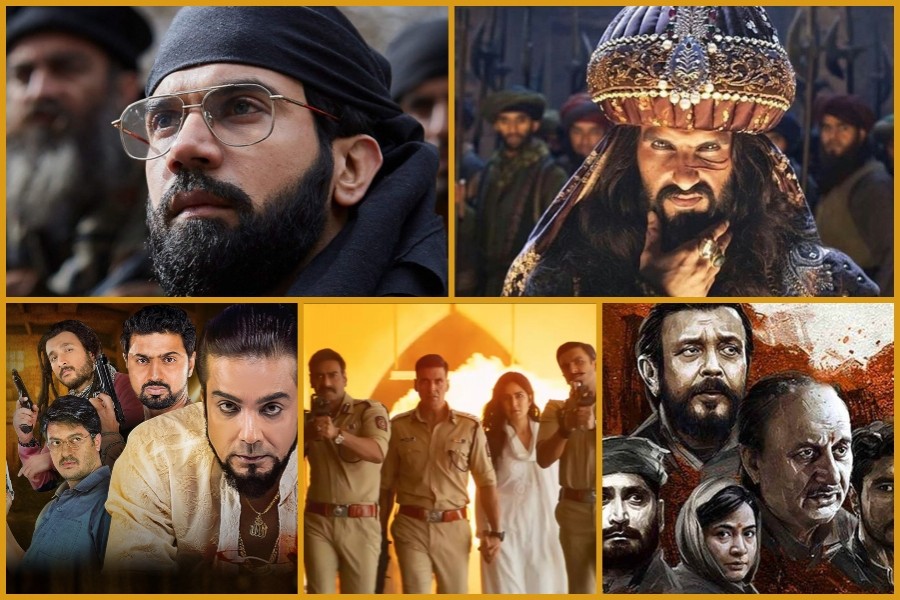India vs Pakistan cricket match is underway, the crowd is enthralled by the sheer excitement that always comes with such matches.
The viewers in front of a television set in Kolkata downtown burst into cheering as Kohli gets out by a Pakistani bowler.
The Muslim muscleman turned gangster, Basheer Ali silences the cheering men with his menacing gaze. This behaviour is tantamount to Basheer Ali’s patriotism, which is eloquently explained by the narrator.
The scene is just a random part of the film unless someone is looking for the subtle underlying message.
Firstly, the Muslim-inhabited Kolkata ghettoes have people who support Pakistan against India. Secondly, Basheer Ali, a Muslim, needs to prove his patriotism, he is not entitled to it by birth.
The scene is taken from the 2016 Srijit Mukherjee film ‘Zulfiqar’ which has an ensemble cast of Tollywood superstars like Prosenjit, Dev, Parambrata, Pauli Dam and Nusrat Jahan.
Take ‘Roja’ - a 1992 Tamil film directed by Mani Ratnam. The film tells the story of an 18-year-old Roja’s quest for finding her husband Rishi, who has been abducted by the Kashmiri separatists.
Her transformation from a village girl from Tamilnadu, who speaks only Tamil, into a valiant woman who is willing to confront vicious terrorists to bring her husband back, is so beautifully woven by Mani Ratnam’s crafty hands that the audience nearly forgets the underlying ‘Good Muslim - Bad Muslim’ narrative.
Here, Rishi reasons with a terrorist Liaqat and makes him understand the value of the motherland. Again, the same old narrative.
The aforementioned two examples are quite subtle, and in a sense, can be given the benefit of doubt of artistic realism.
However, in India where Hindutva dominates the political discourse as the secular scholars express their concern regularly there, the films have quite comfortably shed the subtlety and begun portraying the Muslims in binary light - either you prove your ‘deshbhakti’ or you are a ticking time-bomb.
The problematic portrayal of the Muslims ranges from members of sleeper cells hiding in plain sight as shown in the recent blockbuster ‘Sooryavanshi,’ to the danger of infiltration of Pakistani agents as shown in the 2017 Hansal Mehta film ‘Omerta.’
Films like Sooryavanshi or 2018 Telugu film Goodachari crosses all lines and spout near-stereotypical portrayals of Muslim terrorists going on with devilish machinations in the name of faith and the protagonists save the day with feats befitting that of a demigod.
There have been a few films that try to showcase the other side of the coin as well.
The 2004 film ‘Khakee’ tells the story of how an innocent Muslim man is framed for an alleged terrorism charge. The film was ahead of its time with its portrayal of topics like media trials, mob justice and Islamophobia.
‘Black Friday’ is another film based on the theme of terrorism, where Anurag Kashyap has, with absolute perfection, shown the horrors of the 1992 Mumbai bombings.
The film gives a bone-chilling experience of how utterly terrifying the underground sleeper cells can become and the film quite masterfully deals with such a topic.
Most recently, in the new Bollywood era, films like ‘Mulk’ or ‘Shahid’ tread on land mines as they talk about the growing mistrust and injustice against Muslims.
The humiliated Muslim patriarch in the film cries out a monologue which is perhaps the strongest anti-hatred quote in recent film history - “How can I prove my devotion to the country? You can only love your country.”
This Islamophobia is not restricted to terrorism alone, it spans historical revisionism as well, where the revisionistic version of Indian history is all over the place with its blatant distortions and myth-making.
Films like ‘Padmavaat’ or ‘Panipat’ portray Muslim rulers as evil, scheming and abominable and show the Hindu kings as defenders of both faith and land.
Now, the question may arise - why is it a matter of concern? Indian films have never been much realistic in the first place. It is most likely more of an Indian headache rather than being ours.
The picture is a bit bleaker with much sharper implications. Indians walk, eat, and breathe their film industry, and in turn, the industry shapes their mindset.
While the films perpetuate such Islamophobia, millions of Muslims in India languish in silence. Films like these create public perceptions and an atmosphere of distrust in the society, and the relentless jingoism manifests itself in places like Haridwar where Hindu radicals openly call for ethnic cleansing.
And while the neighbour is playing the lyre of racial hatred and collective blame game, the radicals in Bangladesh might not sit idle.
The communal violence during Durga Puja last year had spilt out to Tripura and the recent anti-Muslim rhetorics have not helped the Tripura Muslims either.
Radicalism and communal hatred is a steep road that spirals only downwards and in a region where borders have been drawn based on religion alone, playing with such fire is bound to create a domino effect; as right across the border, the majority become the minority with the blink of an eye.
In a heated keg of such a hateful atmosphere, things tend to turn unimaginably spiteful that can be only dreamt of in the most horrid nightmares.


